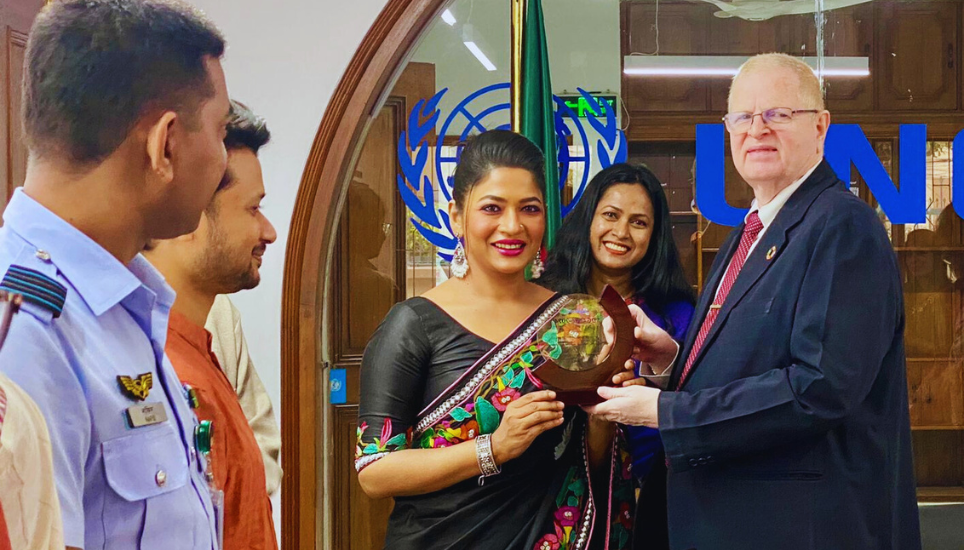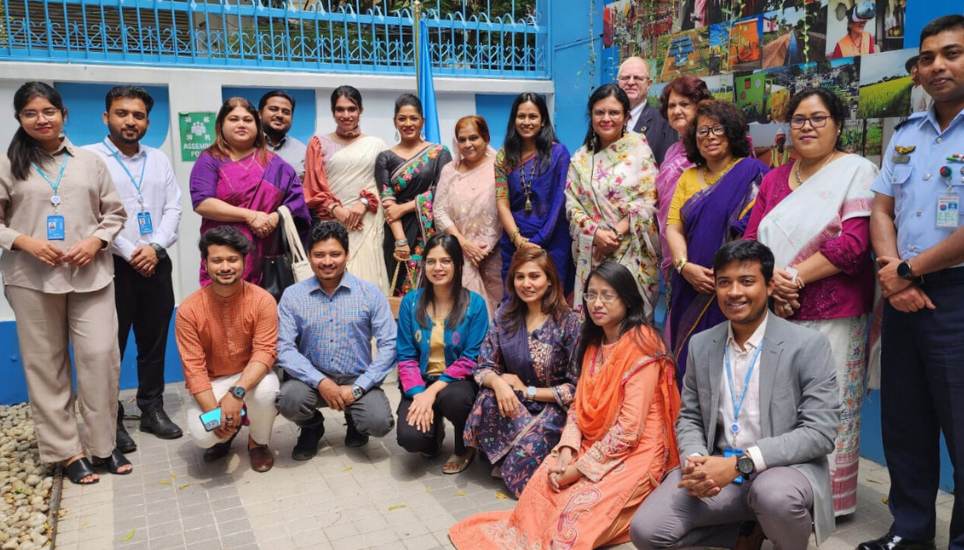
The United Nations Office for Project Services (UNOPS) Bangladesh hosted the 9th episode of "SDG Cafe," on the Sustainable Development Goals (SDG 5), dedicated to advancing gender equality and empowering women in Bangladesh and beyond.
As part of UNOPS’s commitment to getting Agenda 2030 back on track, “SDG Cafe” – a monthly roundtable discussion series dedicated to addressing pressing development challenges and co-creating innovative solutions. This roundtable took place on Thursday with the theme, “Invest in Women: Accelerate Progress.”
The session focused on highlighting the importance of investing in women to foster inclusive and sustainable economic growth, in line with SDG 5.
Addressing the enduring gender disparities in investment, especially in developing nations, the talks revolved around discussing obstacles, prospects, and inventive approaches to boost investment in businesses owned by women, elevate women into leadership positions, and advance initiatives supporting gender parity.
The highlight of the event was the keynote speeches delivered by esteemed personalities – Vice-chancellor of Asian University for Women and Chairperson of Mohammadi Group Huq, and renowned Bangladeshi Actress Azmeri Haque Badhon.
 Rubana's address emphasised the urgency of accelerating investment in women, drawing from her extensive experience in academia and business leadership. Badhon, known for her impactful advocacy on women's rights and social issues, brought a fresh perspective to the conversation, inspiring attendees with her passionate remarks.
Rubana's address emphasised the urgency of accelerating investment in women, drawing from her extensive experience in academia and business leadership. Badhon, known for her impactful advocacy on women's rights and social issues, brought a fresh perspective to the conversation, inspiring attendees with her passionate remarks.
Rubana further highlights, "Empowering women isn't just a moral imperative – it's a strategic necessity for global progress. Data consistently show that investing in women yields high returns in economic growth, GDP, social development, and sustainability.
“We must accelerate our efforts to bridge the gender gap. By harnessing the full potential of women, we unlock solutions to some of the world's most pressing challenges.” She emphasised on the significant yet often overlooked contribution of women to Bangladesh's economy, particularly through their engagement in domestic work.
Currently, women contribute around 20 per cent to the country's economy. However, if the government were to formally recognise and account for the value of domestic work performed by women, their contribution to the GDP could nearly double, potentially reaching close to 50 per cent.
The recognition of domestic work would lead to a substantial shift in how women's economic participation is perceived and measured.
Currently, a significant portion of women's labour, which is primarily focused on household chores and caregiving responsibilities, is not considered in traditional economic indicators.
By acknowledging and valuing this work, it would not only reflect a more accurate representation of women's economic activity but also lead to broader implications for policy-making and social change.
The Country Manager of UNOPS in Bangladesh, Sudhir Muralidharan acknowledged the gravity of the situation and the crucial need for collaborative efforts.
He said, "As we commemorate International Women's Day 2024, let us reaffirm our commitment to gender equality and women's empowerment. Recent data underscores the urgency of our mission – globally, women continue to face significant barriers to full participation in society and the economy.
“According to the World Economic Forum's Global Gender Gap Report 2023, at the current rate of progress, it will take 162 years to close the Political Empowerment gap, 169 years for economic participation and opportunity, and 16 years for Educational Attainment.”
Sudhir added, “Despite progress, South Asia still lags behind, with only 63.4 per cent gender parity achieved. While countries like Bangladesh, Bhutan, and Sri Lanka show promise, others struggle to keep pace.
“As UNOPS Country Manager, I am committed to accelerating efforts to bridge these divides and ensure a future where every individual, regardless of gender, can thrive and prosper with dignity. Let's unite to transform these statistics into stories of progress and equality.”
Azmeri Haque Badhon, renowned Bangladeshi actress said, "As an actress, my journey has been enriched by projects like 'Rayhana Mariam Noor', 'Khufiya' and so on, where I've had the privilege to delve into complex narratives that spotlight the resilience and strength of women.
She added “These films not only showcase the diverse experiences of Bangladeshi women but also challenge societal norms surrounding gender roles. In my personal life, I've encountered both triumphs and challenges including getting the legal guardianship of my daughter, navigating the expectations placed on women in the entertainment industry.
“However, each experience has only fuelled my determination to advocate for gender equality on and off the screen. Through my work and personal endeavours, I strive to inspire others to embrace their authenticity and fight for a world where every individual is empowered to thrive regardless of gender."
Following the keynote speeches, an open discussion ensued, allowing participants to exchange ideas, share experiences, and explore collaborative opportunities in advancing gender equality and women's economic empowerment.
The roundtable discussion sought to facilitate investment in women and address the gender gap in Bangladesh and beyond.
 This SDG Café convened essential stakeholders in Bangladesh, including government representatives, international organisations, and development partners like the Department of Women Affairs (DWA), Armed Forces Division (AFD), Asian Development Bank (ADB), UN agencies, academics, and emerging local entrepreneurs.
This SDG Café convened essential stakeholders in Bangladesh, including government representatives, international organisations, and development partners like the Department of Women Affairs (DWA), Armed Forces Division (AFD), Asian Development Bank (ADB), UN agencies, academics, and emerging local entrepreneurs.
Through meaningful dialogue, they provided guidance and proposed innovative strategies and suggestions to promote gender equality and support investing in women.
About UNOPS
The United Nations Office for Project Services (UNOPS) is a vital operational arm of the United Nations, dedicated to implementing and managing projects in some of the world's most challenging environments.
UNOPS supports the successful implementation of its partners' peace building, humanitarian, and development projects around the world. With over 20 years of experience in Bangladesh, UNOPS is committed to contributing to the achievement of the Sustainable Development Goals in the country.